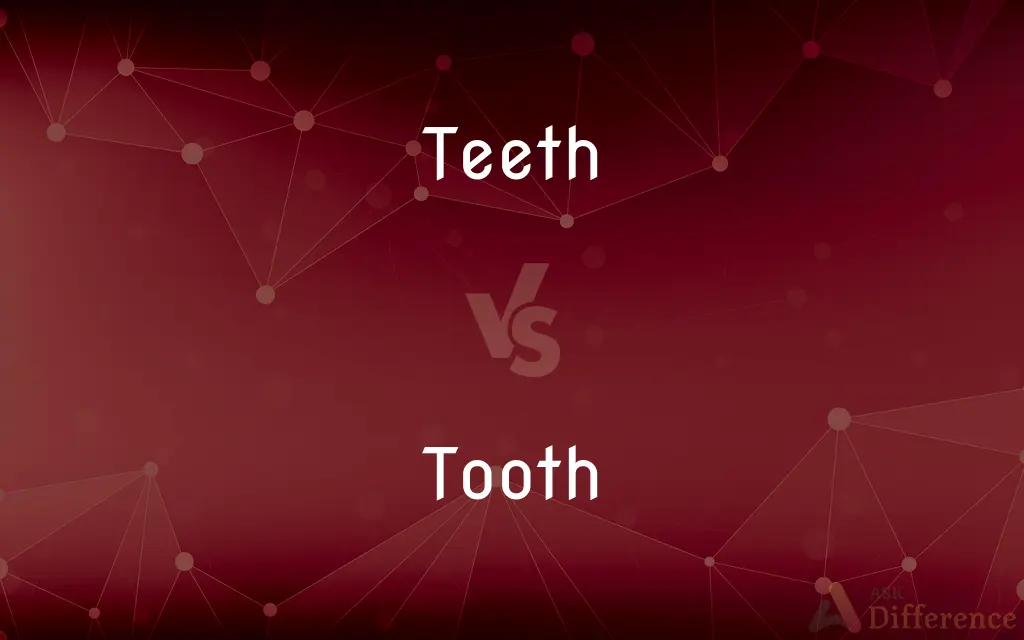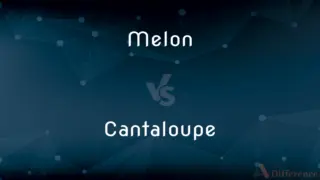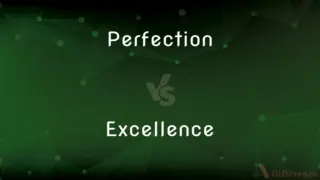Teeth vs. Tooth — What's the Difference?
By Tayyaba Rehman — Updated on November 1, 2023
Teeth are the plural of tooth. A tooth is one individual unit, while teeth refer to multiple units.

Difference Between Teeth and Tooth
Table of Contents
ADVERTISEMENT
Key Differences
Teeth and tooth are both nouns in the English language. They refer to the hard, calcified structures found in the mouths of many animals, including humans. Teeth are the plural form of the word, denoting more than one of these structures. Tooth, on the other hand, denotes a singular structure.
Teeth play a vital role in the digestion process, aiding in the mechanical breakdown of food. Each tooth, regardless of its type, contributes to this function. However, while every tooth plays its part, together as teeth, they provide a synergistic effect, making the chewing process more efficient.
Both teeth and tooth have a similar root structure, containing enamel, dentin, pulp, and cementum. While a single tooth can experience damage or decay, teeth as a collective can also face various ailments such as gum diseases, cavities, or misalignment.
Dental care often involves looking after both individual tooth health and the health of the overall teeth. Regular dental check-ups can identify problems in a single tooth or among multiple teeth, ensuring that both the singular and plural forms are in optimal health.
Aesthetic concerns, like teeth whitening, focus on the visual appearance of teeth as a whole. However, procedures like root canal or extraction are often centered on a problematic tooth.
ADVERTISEMENT
Comparison Chart
Number
Plural
Singular
Refers to
Multiple calcified structures in the mouth
One calcified structure in the mouth
Common Usage
"I brush my teeth every night."
"I have a toothache in my molar."
Associated Ailments
Gum diseases, cavities across multiple teeth
Damage or decay in a single tooth
Dental Care
Overall care for all teeth, e.g., whitening
Care focused on an individual tooth, e.g., extraction
Compare with Definitions
Teeth
Indicators of age in some animals, like rings on a tree.
The horse's teeth revealed its age.
Tooth
A singular hard, calcified structure in the mouth.
She felt pain in her back tooth.
Teeth
Hard, calcified structures used for chewing.
She admired her white teeth in the mirror.
Tooth
A taste or liking for something.
He has a sweet tooth and loves desserts.
Teeth
Points on a tool or machine that engage with another part.
The gears’ teeth meshed perfectly.
Tooth
A tooth (plural teeth) is a hard, calcified structure found in the jaws (or mouths) of many vertebrates and used to break down food. Some animals, particularly carnivores and omnivores, also use teeth to help with capturing or wounding prey, tearing food, for defensive purposes, to intimidate other animals often including their own, or to carry prey or their young.
Teeth
Physical means or strength.
The movement is gaining teeth as more people join.
Tooth
Each of a set of hard, bony enamel-coated structures in the jaws of most vertebrates, used for biting and chewing
Tooth decay
He clenched his teeth
Teeth
A means of attacking or defending.
The new legislation has teeth, ensuring compliance.
Tooth
A projecting part on a tool or other instrument, especially one of a series that function or engage together, such as a cog on a gearwheel or a point on a saw.
Teeth
Plural of tooth.
Tooth
An appetite or liking for a particular thing
What a tooth for fruit a monkey has!
Teeth
(informal) The ability to be enforced, or to be enforced to any useful effect.
The international community's sanctions against the regime had some teeth to them this time around.
Tooth
Roughness given to a surface to allow colour or glue to adhere
The paper used in copying machines is good as it has tooth and takes ink well
Teeth
Dated spelling of teethe
Tooth
One of a set of hard, bonelike structures in the mouths of vertebrates, usually attached to the jaw or rooted in sockets and typically composed of a core of soft pulp surrounded by a layer of hard dentin that is coated with cementum or enamel at the crown and used for biting or chewing food or as a means of attack or defense.
Teeth
To breed, or grow, teeth.
Tooth
A similar hard projection in an invertebrate, such as one of a set of projections on the hinge of a bivalve or on the radula of a snail.
Teeth
The kind and number and arrangement of teeth (collectively) in a person or animal
Tooth
A projecting part resembling a tooth in shape or function, as on a comb, gear, or saw.
Tooth
A small, notched projection along a margin, especially of a leaf. Also called dent2.
Tooth
A rough surface, as of paper or metal.
Tooth
Often teeth Something that injures or destroys with force
The teeth of the blizzard.
Tooth
Teeth Effective means of enforcement; muscle
"This ... puts real teeth into something where there has been only lip service" (Ellen Convisser).
Tooth
To furnish (a tool, for example) with teeth.
Tooth
To make a jagged edge on.
Tooth
To become interlocked; mesh.
Tooth
A hard, calcareous structure present in the mouth of many vertebrate animals, generally used for eating.
Tooth
A sharp projection on the blade of a saw or similar implement.
Tooth
A projection on the edge of a gear that meshes with similar projections on adjacent gears, or on the circumference of a cog that engages with a chain.
Tooth
Of a rope, the stickiness when in contact with another rope as in a knot.
Jute has more tooth than polypropylene.
Tooth
(zoology) A projection or point in other parts of the body resembling the tooth of a vertebrate animal.
Tooth
(botany) A pointed projection from the margin of a leaf.
Tooth
(animation) The rough surface of some kinds of cel or other films that allows better adhesion of artwork.
Tooth
(figurative) Liking, fondness (compare toothsome).
I have a sweet tooth: I love sugary treats.
Tooth
(algebraic geometry) An irreducible component of a comb that intersects the handle in exactly one point, that point being distinct from the unique point of intersection for any other tooth of the comb.
Tooth
To provide or furnish with teeth.
Tooth
To indent; to jag.
To tooth a saw
Tooth
To lock into each other, like gear wheels.
Tooth
One of the hard, bony appendages which are borne on the jaws, or on other bones in the walls of the mouth or pharynx of most vertebrates, and which usually aid in the prehension and mastication of food.
How sharper than a serpent's tooth it isTo have a thankless child!
Tooth
Fig.: Taste; palate.
These are not dishes for thy dainty tooth.
Tooth
Any projection corresponding to the tooth of an animal, in shape, position, or office; as, the teeth, or cogs, of a cogwheel; a tooth, prong, or tine, of a fork; a tooth, or the teeth, of a rake, a saw, a file, a card.
Tooth
A projecting member resembling a tenon, but fitting into a mortise that is only sunk, not pierced through.
Tooth
An angular or prominence on any edge; as, a tooth on the scale of a fish, or on a leaf of a plant
Tooth
Any hard calcareous or chitinous organ found in the mouth of various invertebrates and used in feeding or procuring food; as, the teeth of a mollusk or a starfish.
Tooth
To furnish with teeth.
The twin cards toothed with glittering wire.
Tooth
To indent; to jag; as, to tooth a saw.
Tooth
Hard bonelike structures in the jaws of vertebrates; used for biting and chewing or for attack and defense
Tooth
Something resembling the tooth of an animal
Tooth
Toothlike structure in invertebrates found in the mouth or alimentary canal or on a shell
Tooth
A means of enforcement;
The treaty had no teeth in it
Tooth
One of a number of uniform projections on a gear
Tooth
One point of a cutting or serrated instrument.
The saw's tooth was sharp and ready.
Tooth
A feel or quality, especially of a fabric.
The fabric has a soft tooth, feeling smooth to touch.
Tooth
One of several small projections on a carding instrument.
The tooth of the card helped clean the wool.
Common Curiosities
Can "tooth" be used to denote more than one?
No, "tooth" is singular. "Teeth" should be used for the plural.
What does it mean when someone says they have a "sweet tooth"?
It's an idiomatic expression meaning they have a strong liking for sweet foods.
What are teeth?
Teeth are the plural form of tooth, referring to the multiple hard, calcified structures in the mouth used for chewing.
Do the words teeth and tooth have meanings outside of dental context?
Yes, they can refer to points on tools, machines, or the texture of certain materials.
Why do we say "teeth" and not "tooths"?
English irregular plurals have evolved over time, and "teeth" is the accepted plural form of "tooth."
What's the difference between "long in the tooth" and "by the skin of one's teeth"?
"Long in the tooth" means aging or old, while "by the skin of one's teeth" means narrowly or barely.
Is the word "teeth" always used in a literal sense?
No, it can be used figuratively, as in "The law has teeth," meaning it has power or effectiveness.
How are teeth and tooth used in mechanical contexts?
They can refer to interlocking points on gears or tools that help in transmission or operation.
What is a tooth?
A tooth is a singular, hard, calcified structure found in the mouth, instrumental in chewing and speech.
How are teeth and tooth related?
Teeth is the plural form of tooth. While "tooth" refers to one, "teeth" refers to more than one.
Do both teeth and tooth have cultural or symbolic meanings?
Yes, they can symbolize age, vitality, aggression, or transformation in various cultures.
Why might one refer to the "tooth of time"?
It's a poetic way to describe the effects of time, especially wear and aging.
Is it correct to say "I have a teeth ache"?
No, the correct term is "toothache," even if multiple teeth hurt.
Can animals have a single tooth?
Yes, some animals like the narwhal have a prominent single tooth or tusk.
Why is dental care important for both teeth and tooth?
Dental care ensures the health of individual teeth and the entire set of teeth.
Share Your Discovery

Previous Comparison
Melon vs. Cantaloupe
Next Comparison
Perfection vs. ExcellenceAuthor Spotlight
Written by
Tayyaba RehmanTayyaba Rehman is a distinguished writer, currently serving as a primary contributor to askdifference.com. As a researcher in semantics and etymology, Tayyaba's passion for the complexity of languages and their distinctions has found a perfect home on the platform. Tayyaba delves into the intricacies of language, distinguishing between commonly confused words and phrases, thereby providing clarity for readers worldwide.














































